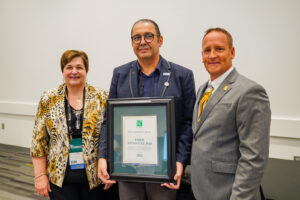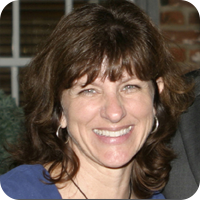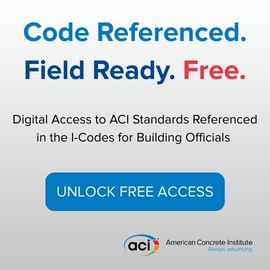
PMG Leadership Award: Dr. Esber Andiroglu
Dr. Esber Andiroglu was honored for his commitment to the advancement of PMG knowledge by conducting research and creating solutions to address some of the biggest challenges our planet is currently facing
Each year, the International Code Council recognizes peers and colleagues who are a reflection of what the association stands for: dedication to developing model codes and standards used in the design, build and compliance process to construct safe, sustainable, affordable and resilient structures. The Code Council and its Membership Councils honored several outstanding individuals and organizations for their accomplishments and contributions to building safety and resiliency in their communities during the 2022 Annual Conference in Louisville, Kentucky.

Given to an individual or organization for exceptional service to the plumbing, mechanical, fuel gas and swimming pool/spa (PMG) industry, the PMG Leadership Award recognizes contributions to the growth and enhancement of PMG codes and standards, advocacy in state and local code adoptions, publication of PMG technical articles or research papers, advancement of PMG knowledge through training and education, extensive Code Council committee or council service, development of innovative PMG products and services, and notable advancement of the PMG industry. This year’s recipient of the 2022 PMG Leadership Award is Dr. Esber Andiroglu, Ph.D., P.E., LEED AP, a professional engineer and associate professor of practice with primary appointment in the Department of Civil and Architectural Engineering and secondary appointments in the Department of Chemical, Environmental & Materials Engineering and at the School of Architecture of the University of Miami in Coral Gables, Florida.
Dr. Andiroglu is recognized for his commitment to the advancement of PMG knowledge by conducting research and creating solutions to address some of the biggest challenges our planet is currently facing. He has been instrumental in leading research on smart water-energy infrastructure and pipe sizing in response to climate change challenges and water shortages in urban community settings, and most recently, a focus on pandemic lessons learned to reduce public health risks.
For all of this and much more, Dr. Andiroglu demonstrates exceptional technical acumen, extensive service to code development and a number of notable advancements to the PMG industry.
Virtual flow focused
Among his other titles, Dr. Andiroglu is also the director of the University of Miami College of Engineering’s Master of Science in the Construction Management Program, a practice-oriented advanced graduate degree that offers a blend of construction and business management courses with a focus on building environmental systems, water resources and sustainability.
His work in the area of smart water distribution, for instance, is helping to right-size and modernize our nation’s antiquated plumbing infrastructure design criteria so that we can all enjoy safe and clean water when we need it. Much of his research is in the development of virtual fan/pump flow meters and their application towards operational efficiency and optimization of air/water conveyance systems.
“Measuring flow, whether in a pipe network or ductwork, is done most frequently with ultrasonic-based meters,” explains Dr. Andiroglu. “And to get effective flow data, an operator would have to place [meters in] several systems. Doing this on a large scale is time-consuming and expensive, as they have to be purchased, installed and regularly calibrated.”
Thus began his quest to develop a cost-effective, easy-to-deploy, virtual flow meter that uses power input to measure flow pressure. He adds, “Pressure reading technology is cheap, so I just needed an algorithm to predict flow rates based on power and pressure.”
The virtual flow meter solution that he developed with his colleague Dr. Gang Wang (associate professor in the Department of Civil & Architectural Engineering at the University of Miami) can predict flow rates to virtually 98.5 percent accuracy. That advancement opened the door for the development of more energy-efficient HVAC systems — and a foundational solution for water and wastewater pump station energy improvements.
With an eye on rethinking the wastewater side of distribution systems and flow conveyance — something that the Code Council’s PMG Group is especially interested in — Dr. Andiroglu and Dr. Wang, in partnership with the Miami-Dade County Water and Sewer Department, initiated a pilot project in the local community to apply virtual flow metering technology as a way to improve operational efficiencies of wastewater pump stations.
He adds, “The agency has three pumps that operate in series. Like any municipality, demand varies depending on usage. With these virtual flow meters, operators are able to optimize pump station operation.”
His next area of focus? Water supply and wastewater pipe sizing for residential, institutional and mixed-use occupancies. Dr. Andiroglu’s team is conducting research on behalf of the Code Council to assist with the development of its ANSI standard, ICC 815 — Standard for Sizing Water Distribution, Sanitary Drainage and Vent Piping Systems. This standard will take a holistic worldwide approach on sizing water, sewer and venting piping systems that utilize a sizing method that has no basis on Hunter’s Curve Method and accounts for post-COVID-19 usage patterns. Currently, the Code Council is accepting applications until Friday, Sept. 30, 2022, to serve on the Sizing Water Distribution, Drainage and Venting Standard Consensus Committee (IS-SWDDV) that will be charged with the development of this standard.
Conveyance adjustments
“As an industry, we’ve deployed water-conserving plumbing fixtures such as dual flush toilets and faucet flow restrictors,” Dr. Andiroglu notes. “However, we’re still sizing the distribution pipe networks using projected flow rate techniques developed in the 1940s. Thus, while we’re producing less flow at the source, the slower flow rate in the conveyance system creates more opportunities for the formation of biofilm on the inner walls of piping and the development of pathogens in the water stream, which poses various public health hazards for consumers. In addition, oversized distribution pipes translate to pressure losses, which ultimately result in requirements for additional pumping energy, thus reducing the conservation benefits originally intended.”
With an eye on new pipe sizing standards for the Code Council, Dr. Andiroglu is looking at the water and wastewater pipe sizing based on regional and cultural norms for water use. That interest led to a more focused look at the use of septic tanks in South Florida.
He explains, “In our region, we have several communities that rely on septic systems as a localized on-site treatment option when the public sewer utility is not available. However, during the recent decades, drainfields associated with such septic systems are no longer performing their originally intended functions due to rising sea levels and frequently occurring flood events resulting in saturated soil conditions, thus causing release of nutrient-rich wastewater streams into the surrounding landscape and bodies of water in coastal communities.”
Dr. Andiroglu’s team will be partnering with the Code Council in conducting the necessary research for the development of another ANSI standard, ICC 825 — Private Sewage Disposal Systems. This standard will address the design, construction, material, location, operation and maintenance requirements for private sewage disposal systems based on newer technologies and methods, and the impacts of climate change, that can be used both domestically and internationally. Just like for the IS-SWDDV, the Code Council will be accepting applications until Friday, Sept. 30, 2022, for the Private Sewage Disposal Systems Standard Consensus Committee (IS-PSDS) charged with the development of this standard.
Rethinking coastal structures
Dr. Andiroglu says one of the things that he appreciates about the Code Council is its forward-looking approach to code development as he continues to right size pipe distribution systems and adapt on-site private wastewater treatment and disposal systems.
“As new advancements emerge, such as new standards for pipe distribution systems or emerging requirements for on-site wastewater treatment and disposal systems, codes will also adjust and ICC is on top of it,” he adds. “My research team and I are working with them to develop these new standards to address community water and wastewater systems, as well as treatment, reclamation and reuse.”
His additional research on next-generation coastal building techniques will be critical to improving resilience in the built environment, especially in areas where severe weather is often a threat. He is currently engaged in a University of Miami Laboratory for Integrative Knowledge (U-LINK) research project that is focused on the development of next-generation coastal structures in response to climate change impacts in local communities and beyond.
The Wahoo Bay SEAHIVE™ project, an engineered marine and estuarine protection system under development at the University of Miami, is focused on developing an ecologically friendly yet structurally safe alternative to seawalls. Dr. Andiroglu is also involved in a multidisciplinary study to investigate the use of satellite geodesy to monitor building subsidence.
Continuous improvement
In 2021, Dr. Andiroglu also took on a new area of focus as the acting chair of the International Code Council’s Mechanical, Plumbing and Electrical sub-committee for the Pandemic Task Force. Entrusted with developing resources to help prepare buildings and communities for disease-related threats, the board of the Pandemic Task Force analyzes all aspects of the built environment to find solutions that reduce the potential risks posed by pandemics.
The Pandemic Task Force Committee consists of a broad cross-section of building, code, design, insurance, plumbing and public health environmental experts appointed by the Code Council Board of Directors. This group is reviewing current code requirements, existing guides, executive orders, regulations, standards and much more related to the design, preparedness and health considerations for building construction, operation and pandemic considerations with the goal of identifying best practices. The group plans to deliver a comprehensive package of public information materials once research is complete.
Dr. Andiroglu’s vision for improving plumbing infrastructure and the necessary code development, community climate change and his dedication to educating the next generation of engineers, is to be commended. He’s certainly a deserving winner of the PMG Leadership Award.
When accepting the award, Dr. Andiroglu said, “I am honored to have been selected for this prestigious award and deeply appreciate that the ICC community values my contributions with the water/wastewater resilience-focused research activities and the Pandemic Task Force are worthy of such an award.”
The International Code Council congratulates Esber Andiroglu as the recipient of its 2022 PMG Leadership Award.
View past recipients of the PMG Leadership Award.
Membership Councils make a difference
The Membership Councils of the International Code Council offer members a place to come together and be a more powerful force shaping your association, your industry, your career and your future. The Code Council Board of Directors offers six discipline-specific Membership Councils — the Building Membership Council, Fire Service Membership Council, PMG Membership Council, Sustainability Membership Council, ICC Global Membership Council, and Emerging Leaders Membership Council — that each serve to take your membership and profession to the next level. Share your expertise, voice and vision with your peers.
Learn more about International Code Council Membership Councils.








